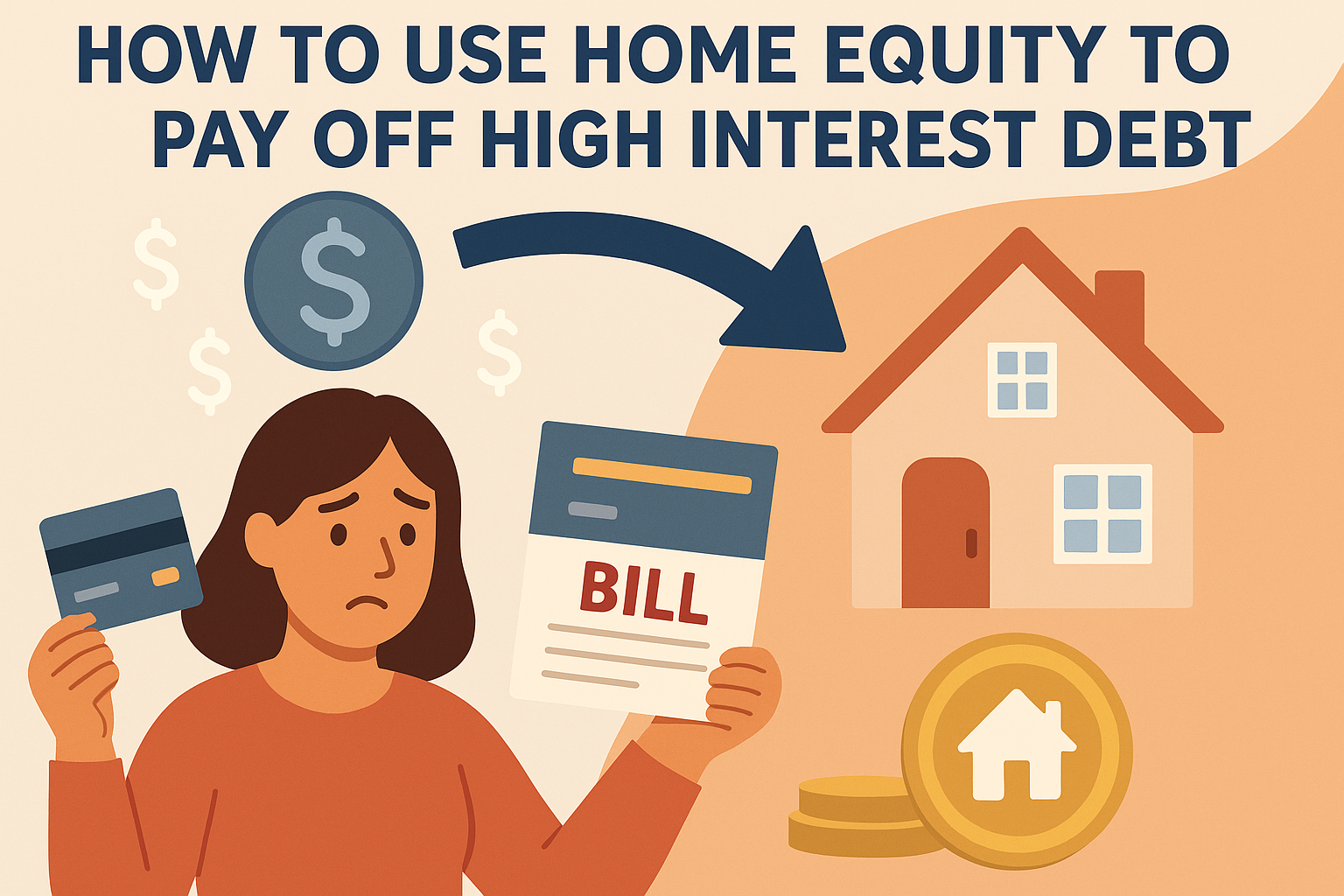Licensed in:
How to Use Home Equity to Pay Off High Interest Debt
If you are feeling the weight of credit card debt, personal loans, or unexpected bills piling up, you are not alone. With inflation, rising costs, and interest rates that have remained high, many people are looking for smarter ways to...

If you are feeling the weight of credit card debt, personal loans, or unexpected bills piling up, you are not alone. With inflation, rising costs, and interest rates that have remained high, many people are looking for smarter ways to manage their debt and take back control of their finances.
One option that can provide meaningful relief is using the equity in your home. It may not be the first solution that comes to mind, but for many homeowners, it could be the most powerful financial tool they have.
What Is Home Equity?
Home equity is the difference between what your home is worth and what you still owe on your mortgage. For example, if your home is valued at $400,000 and you owe $250,000, your equity is $150,000.
As home values have climbed over the past few years, many homeowners have built significant equity without even realizing it. That equity can be accessed and used for big life expenses, including paying off high interest debt.
Why Use Home Equity to Pay Off Debt?
When used wisely, home equity can be a way to consolidate and eliminate higher interest debt, such as credit cards or personal loans. Here are a few reasons it can make financial sense:
Lower interest rates
Even in a high rate environment, mortgage rates are often much lower than the average credit card rate, which can reach 20% or more. Using equity to pay off those balances could reduce your interest dramatically.
Simplified payments Instead of juggling multiple bills and due dates, consolidating your debt through your mortgage can mean making just one monthly payment, which may also be lower overall.
Potential tax benefits
In some cases, the interest paid on home equity loans or cash out refinances may be tax deductible. You should always check with a tax professional to see if this applies to your situation.
Two Main Ways to Tap Into Your Equity
There are two common ways homeowners access their equity to pay down debt. The right option for you will depend on your needs and financial situation.
Cash out refinance
This replaces your current mortgage with a new one for a larger amount. You receive the difference in cash, which you can use to pay off debt. For example, if you owe $200,000 on your mortgage and refinance for $250,000, you would receive $50,000 in cash at closing.
Home equity loan or line of credit (HELOC)
A home equity loan gives you a lump sum, while a HELOC gives you a line of credit that you can draw from as needed. These options do not affect your primary mortgage but do require a second loan. HELOCs often have variable rates, while home equity loans usually have fixed rates.
Things to Consider First
While using home equity to pay off debt can be a smart strategy, it is not without risk. Here are a few important things to consider before making a move:
You are putting your home on the line
Credit card debt is unsecured, but your mortgage is not. That means if you are unable to keep up with payments after refinancing or taking out a loan, your home could be at risk.
You need to address the root cause
Paying off credit cards with equity can offer breathing room, but if overspending is the issue, those balances could creep back up. Make sure you have a plan in place to avoid falling into the same cycle.
Closing costs and fees
Refinancing or taking out a loan comes with fees, which are sometimes thousands of dollars. Make sure the overall savings from lower interest and simplified payments are worth the upfront costs.
Loan terms may change
If you refinance into a new 30 year mortgage, you may end up paying more interest over time, even if your monthly payment drops. You may want to ask about shorter term options or make extra payments to stay on track.
What Lenders Look For
To qualify for a cash out refinance or home equity loan, lenders will review:
- Your credit score: Higher scores often mean better rates, but many programs are available for borrowers with fair credit.
- Your home equity: Most lenders want to see at least 15 to 20% equity left in the home after the new loan is issued.
- Your debt to income ratio: This measures how much of your income goes toward debt payments. Most lenders look for a ratio below 43%, though some allow higher.
Is It Right for You?
Using home equity to pay off debt is not about quick fixes. It is about creating breathing room and long term stability. If you have built up equity and are struggling with high interest debt, this may be the tool that lets you reset and move forward.
The best way to know if this is the right move for you is to talk to a trusted mortgage advisor who can walk you through your numbers and your options. There’s no pressure, just honest guidance.
At Neighborhood MC, we are excited to help you with your mortgage needs. No challenge is too great for us.